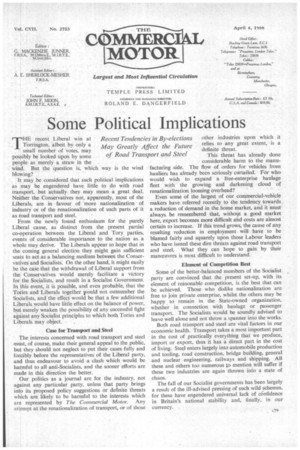Some Political Implications
Page 31

If you've noticed an error in this article please click here to report it so we can fix it.
THE recent Liberal win at Torrington, albeit by only a small number of votes, may possibly be looked upon by some people as merely a straw in the wind. But the question is, which way is the wind blowing?
It may be considered that such political implications as may be engendered have little to do with road transport, but actually they may mean a great deal. Neither the Conservatives nor, apparently, most of the Liberals, are in favour of more nationalization of industry or of the renationalization of such parts of it as road transport and steel.
From the newly found enthusiasm for the purely Liberal cause, as distinct from the present partial co-operation between the Liberal and Tory parties, events of considerable importance to the nation as a whole may derive. The Liberals appear to hope that in the coming general election they might gain sufficient seats to act as a balancing medium between the Conservatives and Socialists. On the other hand, it might easily be the case that the withdrawal of Liberal support from the Conservatives would merely facilitate a victory for the Socialists, and result in a Socialist Government. in this event, it is possible, and even probable, that the Tories and Liberals together would not outnumber the Socialists, and the effect would be that a few additional Liberals would have little effect on the balance of power, but merely weaken the possibility of any successful fight against any Socialist principles to which both Tories and Liberals may object.
Case for Transport and Steel The interests concerned with road transport and steel must, of course, make their general appeal to the public, but they should not neglect to put their cases fully and forcibly before the representatives of the Liberal party, and thus endeavour to avoid a clash which would be harmful to all anti-Socialists, and the sooner efforts are made in this direction the better.
Our politics as a journal are for the industry, not against any particular party, unless that party brings into its proposed policy suggestions or definite threats which are likely to be harmful to the interests which are represented by The Commercial Motor. Any attempt at the renationalization of transport, or of those other industries upon which it relies to any great extent, is a definite threat.
This threat has already done considerable harm to the manufacturing side. The flow of orders for vehicles from hauliers has already been seriously curtailed. For who would wish to expand a free-enterprise haulage fleet with the growing and darkening cloud of renationalization looming overhead?
Even some of the largest of our commercial-vehicle makers have referred recently to the tendency towards• a reduction of demand in the home market, and it must always be remembered that, without a good market here, export becomes more difficult and costs are almost certain to increase. If this trend grows, the cause of any resulting reduction in employmentwill have to be blamed fairly and squarely upon those Labour leaders who have issued these dire threats against road transport and steel. What they can hope to gain by their manceuvres is most difficult to understand.
Element of Competition Best Some of the better-balanced members of the Socialist party are convinced that the present set-up, with its element of reasonable competition, is the best that can be achieved. Those who dislike nationalization are free to join private enterprise, whilst the others may be happy to remain in the State-owned organization, whether in connection with haulage or passenger transport. The Socialists would be soundly advised to leave well alone and not throw a spanner into the works.
Both road transport and steel are vital factors in our economic health. Transport takes a most important part in the cost of practically everything that we produce, import or export, thus it has a direct part in the cost of living. Steel enters largely into automobile production and tooling, road construction, bridge building, general and nuclear engineering, railways and shipping. All these and others too numerous to mention will suffer if these two industries are again thrown into a state of chaos.
The fall of our Socialist governments has been largely a result of the ill-advised pressing of such wild schemes, for these have engendered universal lack of c6nfidence in Britain's national stability and, finally, in our currency.












































































































